To catch impaired drivers, the Huntington Beach Police Department and many other law enforcement agencies frequently set up DUI checkpoints. These checkpoints have sparked debates regarding their legality and effectiveness. This blog explores California’s legal framework surrounding DUI checkpoints and provides insights on how individuals can contest DUI charges if they find themselves facing such allegations.
Legal Framework of California DUI Checkpoints
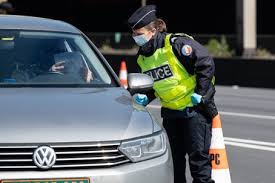
Driving under the influence (DUI) checkpoints are a common sight on California roads, especially during holiday weekends and major events. Understanding the legal framework that governs these checkpoints is essential for both Orange County DUI lawyers and those facing DUI charges. Here’s an overview of the legal principles and requirements that shape DUI checkpoints in California.
Constitutional Basis and Legal Precedents
DUI checkpoints, sometimes referred to as sobriety checkpoints, have their legal foundations in the Fourth Amendment of the United States Constitution, which protects individuals from unreasonable searches and seizures. In a landmark decision in 1990, the U.S. Supreme Court ruled in Michigan Dept. of State Police v. Sitz that DUI checkpoints are constitutional because their purpose—promoting road safety—outweighs the brief intrusion of motorists, provided certain checks and balances are in place.
In California, the legality of DUI checkpoints is also supported by state court decisions. The California Supreme Court upheld their legality in Ingersoll v. Palmer (1987), setting out specific guidelines that law enforcement must follow to ensure the checkpoints comply with constitutional standards. These precedents affirm that while drivers do not entirely waive their Fourth Amendment rights at these checkpoints, the need for public safety justifies their use.
Requirements for DUI Checkpoints to be Legal
For a DUI checkpoint to be considered legal in California, it must adhere to several strict requirements established both by the courts and statutory regulations. These requirements are as follows:
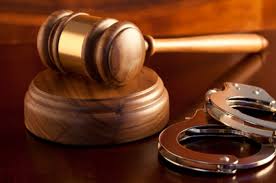
– Supervisory Decision-Making: The decision to set up a checkpoint must be made by law enforcement supervisors, not by officers in the field.
– Reasonable Location: The chosen location should be based on a clear, logical rationale, such as a history of DUI-related accidents in the area.
– Clear Identification: Checkpoints must be clearly identified as police operations, providing obvious indicators such as signage, lighting, and the presence of law enforcement vehicles.
– Time and Duration: The timing and duration of checkpoints should be reasonable, taking into account traffic patterns and effectiveness without causing undue inconvenience to motorists.
– Minimal Intrusion: Procedures at the checkpoint should minimize the length of the stop. Typically, a brief interaction involving a line of questioning and observation should not evolve into a full search without probable cause.
– Advanced Public Notification: While not required, publicizing the time and location of checkpoints in advance is encouraged as a best practice, and it often occurs through local news outlets or social media channels. You can find DUI checkpoints in Orange County here: Orange County DUI Checkpoints.
Adhering to these guidelines ensures that checkpoints meet constitutional standards, aiming to balance public safety needs with individual rights.
Recent Changes in DUI Checkpoint Laws
Recent legislative changes and developments in California law have influenced how DUI checkpoints operate. These changes focus on evolving road safety needs and the effective deployment of law enforcement resources. For instance, technological advances have seen the integration of more efficient communication tools at checkpoints, allowing officers to verify driver information quickly. Additionally, there is a growing emphasis on training officers to recognize impaired driving signs beyond just alcohol, such as drug impairment.
Furthermore, public concern regarding civil liberties has led to discussions about the transparency and accountability of checkpoint operations. Enhanced data collection practices have been implemented to assess the effectiveness and fairness of checkpoints, ensuring they are not disproportionately targeting specific demographics or areas without justifiable cause.
What to Expect at a DUI Checkpoint
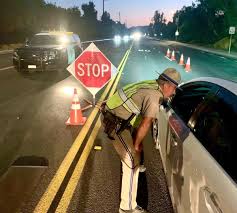
Understanding what to expect when approaching a DUI checkpoint can alleviate anxiety and ensure that the interaction is as smooth and efficient as possible. Being informed about procedures, rights, and common misconceptions can empower drivers during these routine stops.
Procedures and Interactions with Law Enforcement
When you approach a DUI checkpoint, you’ll usually see signs indicating its presence, along with traffic cones and the visible presence of police officers. Here’s a step-by-step expectation of the interaction:
1. Approach and Stop: As you approach the checkpoint, follow the directions of any officers signaling to stop. You may be directed into a specific lane for processing.
2. Initial Contact: An officer will approach your vehicle, often requesting your driver’s license, registration, and insurance documentation. Be prepared to hand these over upon request.
3. Observation and Inquiry: The officer will observe signs of impairment, such as slurred speech, red eyes, or the odor of alcohol. They may ask questions about your destination and activities.
4. Secondary Inspection: If warranted by the initial interaction, such as signs of impairment or inability to produce proper documentation, you may be directed to a secondary check area for further questioning or sobriety testing.
The process is generally designed to be as brief as possible, focusing on efficiency while ensuring thoroughness in detecting impaired drivers.
Your Rights as a Driver
While participating in a DUI checkpoint, it’s crucial to recognize your rights:
– Right to Remain Silent: You are not obligated to answer every question posed by the officer, such as those potentially incriminating about your drinking activities.
– Protection Against Unjust Search: Without probable cause or explicit consent, you cannot be forced to undergo a vehicle search.
– Right to Refuse Certain Tests: Although field sobriety tests can be refused, note that refusal of chemical tests (breath, blood, or urine) post-arrest may result in license suspension under implied consent laws.
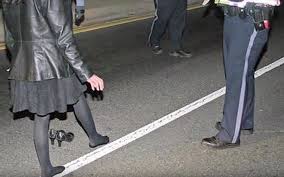
Understanding these rights can help in navigating interactions at DUI checkpoints while remaining compliant with legal expectations.
Common Misconceptions About DUI Checkpoints
Knowledge dispels fear, and clearing up common misconceptions regarding DUI checkpoints is essential. Here are a few widely held, yet incorrect, beliefs:
– Checkpoints Violate Privacy: As affirmed by legal rulings, DUI checkpoints are structured to preserve each individual’s constitutional rights while targeting public safety concerns.
– Entitlement to Avoidance: While it’s legal to turn away or choose an alternate route before entering a checkpoint, any abrupt U-turns or evasive actions may draw suspicion and further investigation. In other words, if a cop sees you legally avoid a checkpoint, that cop will likely follow you and look for a legal reason to stop you, such as a license plate lamp that doesn’t work or expired tags.
– Infallibility of Checkpoints: Mistakes happen. If you believe your stop was mishandled or your rights were violated, these checkpoints are not beyond legal challenge.
Understanding the procedural, legal, and rights-oriented dimensions of DUI checkpoints helps ensure that drivers are prepared to handle these encounters with confidence and clarity.
In conclusion, California DUI checkpoints are legally complex operations with specific requirements and expectations. By familiarizing yourself with the legal framework, procedural norms, and your rights, you can navigate these checkpoints effectively. If you find yourself facing a DUI charge arising from a checkpoint, seeking professional legal advice from a seasoned Orange County DUI attorney is crucial to mount a robust DUI defense. An experienced Orange County DUI lawyer can provide the necessary guidance and representation to challenge any potential flaws or rights violations encountered during a checkpoint stop.
Strategies to Fight a DUI Charge

Facing a DUI charge can be an overwhelming experience; however, there are several strategies that can be employed to challenge these charges effectively. Understanding the nuances of DUI laws and leveraging legal defenses are key to navigating such situations. The following sections outline potential strategies to consider when contesting a DUI charge.
Challenging the Legality of the Checkpoint
One of the foremost strategies to contest a DUI charge is by questioning the legality of the DUI checkpoint where the stop occurred. In California, checkpoints must adhere to specific legal requirements. These include:
– Advance Public Notification: Law enforcement must publicly announce the planned checkpoint to allow for community awareness.
– Neutral Formula for Stops: Officers cannot randomly stop vehicles. There must be a neutral formula, such as stopping every third car, to ensure impartiality.
– Safety Procedures: The checkpoint must be set up to ensure the safety of both officers and drivers.
– Reasonable Duration: Stops should be brief, ensuring minimal intrusion and delay for motorists.
If any of these requirements are not met, there may be grounds to argue that the checkpoint stop was unlawful, potentially leading to the dismissal of the DUI charge.
Examining the Evidence and Arrest Procedure
Another critical strategy is to scrutinize the evidence and procedures used during the arrest. This involves:
– Reviewing Field Sobriety Tests (FSTs): The accuracy and administration of FSTs can sometimes be challenged. Environmental factors, improper instructions, or the individual’s physical limitations may undermine the test’s reliability.
– Analyzing Breathalyzer Calibration and Results: Breathalyzer devices must be properly maintained and calibrated to produce accurate readings. Errors in calibration or administration can be grounds for contesting the results.
– Evaluating Officer Conduct and Statements: It’s essential to assess whether the arresting officer followed protocol and provided the appropriate warnings, such as Miranda Rights.
Carefully examining these aspects can uncover procedural errors or inconsistencies in evidence that might weaken the prosecution’s case.
Hiring a DUI Defense Attorney
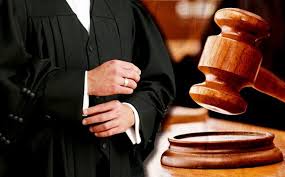
Hiring a seasoned Huntington Beach DUI attorney is often pivotal in effectively challenging a DUI charge. A knowledgeable attorney can:
– Navigate Legal Complexities: DUI laws are intricate, and a Huntington Beach DUI lawyer is equipped to interpret and utilize these laws to your advantage.
– Negotiate Plea Deals: In some cases, an Orange County DUI attorney can negotiate a plea deal, potentially reducing charges or penalties.
– Represent You in Court: An experienced DUI attorney can provide representation in court, presenting defenses and arguing for the best possible outcome.
Having professional legal representation not only enhances your chances of a favorable result but also provides peace of mind during a stressful process.
In conclusion, understanding and implementing strategic defenses can significantly impact the outcome of a DUI charge. Whether it’s questioning the legality of a checkpoint, scrutinizing evidence, or hiring a skilled defense attorney, taking informed action is crucial. Through these strategies, individuals facing DUI charges can better protect their rights and interests.
Conclusion
In conclusion, California DUI checkpoints are indeed legal and serve as a tool for law enforcement to prevent impaired driving. However, this does not mean that individuals charged with a DUI at a checkpoint are without recourse. Understanding the legality of these checkpoints and the rights you hold is crucial.
If you find yourself facing a DUI charge, it’s essential to consult a qualified DUI lawyer who can provide the following services:
– Evaluate the nuances of your case
– Assess the legality of the checkpoint stop
– Challenge any evidence that may be improperly obtained
Remember that building a robust DUI defense often requires expert knowledge of DUI laws and thorough examination of all details surrounding your case. Taking these steps can significantly impact the outcome of your situation.